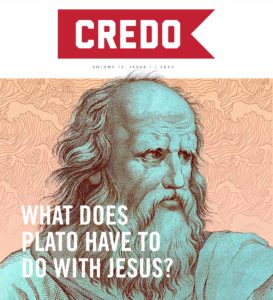In Union with Christ: Reframing Theology and Ministry for the Church, J. Todd Billings explores the manifold grace God gives the church through uniting her to Himself in Christ. Billings draws upon the New Testament and the Reformed tradition to offer five distinct reflections on how union with Christ shapes the church’s life, hope, and service. Though diverse in their insights, Billings’ reflections are linked by a common thread: Christ’s union with human beings is the content, power, and telos of redemption.
The Gospel and Union
“Union with Christ is theological shorthand for the gospel itself,” Billings begins on page 1. Chapter one develops this by identifying the doctrine of adoption in terms of union with Christ. “[I]n adoption, we…enter into the playful, joyous world of living as children of a gracious Father, as persons united to Christ and empowered by the Spirit” (p. 25, emphasis in original). Billings contrasts this biblical view of God with the culturally caricatured God of “moralistic therapeutic deism,” who stands at a distance from His children, measuring and judging their moral progress (pp. 21-25). Rather, in light of union with Christ, the true God is He who lovingly adopts and enlivens His children by drawing them into His life (pp. 26-31).
Chapters two and three deepen the contemplation on God’s grace by showing how He draws near His people to bring them salvation. Drawing particularly from John Calvin and Augustine, Billings argues in chapter two that the Reformed doctrine of total depravity is a biblical “corollary” to union with Christ (p. 36). He grounds this thesis in Scriptures like John 15:5, Romans 6:16-18, and Colossians 2:13, illuminating how human beings are powerless to regain communion with God unless God graciously removes their sin and draws them into communion with Him—which He does through uniting them to Christ, who gives the “double grace” of His justifying righteousness and sanctifying power to remove their sin (pp. 43-50).Union with Christ is theological shorthand for the gospel itself. Click To Tweet
In chapter three, Billings responds to those who would pit God’s attributes of incomprehensibility and transcendence against His revelation and immanence (pp. 67-69). Here, Billings retrieves the patristic notion of accommodation (p. 68), as well as further insight from Calvin, Herman Bavinck, and Franciscus Junius, to show that the mysterious and infinite God can be known by human beings precisely because He is able to communicate Himself to them in a way that does not erase their humanity (p. 77). He does this through “the divine condescension in the incarnation of Jesus Christ” (p. 84). Christ is the perfect union of human and divine, and He communicates the Word of God by which human beings receive salvation, union with God, and eternal life where they will know Him face-to-face (pp. 80-89).
The final two chapters are the most immediately applicable to Christian service and gospel ministry. In chapter four, Billings engages Article 4 of the Belhar Confession to “clarify” the “theological rationale” for Christian justice ministry (p. 97) in terms of union with Christ (p. 107). Through their union to Christ, human beings receive God’s justice in Christ’s righteousness, by which He transfers them from death to life and enlivens them with His Spirit to do His just works after Him (pp. 107-18). This chapter also explores how the unity of all Christians to Christ entails “the church’s God-given identity” as united to each other (p. 115). Therefore, their communal life, in worship and the Lord’s Supper, should reflect this identity, rejecting any division in which “[T]he gospel reality of this oneness…is obscured and contradicted” (p. 101; cf. pp. 103, 112-14).
The final chapter exhorts cross-cultural ministers to root their ministry in the soil of union with Christ rather than ministry models that seek “oneness” with a culture by imitating the incarnation (pp. 124-26). Billings argues that the New Testament does not present the incarnation as a ministry example, for it is “unique and unrepeatable” (p. 124) since it is divine (p. 135). Instead, the incarnation is the means by which Christ alone unites people to Himself and draws them into His ministry of uniting “a diverse people into the one body of Christ” (p. 159; cf. pp. 151-60). Billings presents this ministry model as crucial for true gospel witness, since “The good news of the gospel is Jesus Christ and union with him” (p. 158). Moreover, because of their union with Christ, gospel ministers can bear fruit not by trying to replicate His example, but because they already share in His life (pp. 148-60).
Practical Theology for the Church
Billings’ emphasis on the “divinely initiated” character of union with Christ (p. 61; cf. p. 91) makes Union with Christ a particularly practical theology book for the church. In every chapter, Billings displays God as the One who establishes union with the church by His own power and will. He brings His adopted children into His joyful identity, raising them to eternal life from their deadness and impotence in sin. Moreover, He alone reveals the knowledge of Himself that leads to this fellowship, recreates them to be one body through His justifying mercy, and enlivens them for service to Him by putting His own life, His Spirit, within them. This “generosity” (p. 26) glimpses the immeasurable riches of God’s love for human beings.Union with Christ is an accessible starting point for deeper theological study on union with Christ and for applying this wonderful doctrine to encourage God’s people and proclaim His glorious grace. Click To Tweet
Furthermore, this God is the transcendent, infinite One in whom all creation holds together (Colossians 1:17), and in whom there is no “shadow due to change” (James 1:17). Therefore, union with Him is absolute and unchanging. Such assurance frees Christians to do His works empowered by Him, and it secures their confidence that He will bring them into His eternal dwelling. Moreover, it reveals that the church’s identity as the one, reconciled body of Christ is a real consequence of dwelling in Him, a reality that makes believers agents in His own redemptive work. In sum, by emphasizing the divine source of the church’s union with Christ, Billings’ reflections proclaim the gospel and provide true encouragement for believers in their faith, obedience, and assurance of salvation.
Billings sets forth his reflections as a “theological entryway for rediscovering the mystery of the Christian life—life in Christ” (p. 14). By its strengths in both scholarship and evangelism, Union with Christ can indeed help theologians and pastors develop further reflection and teaching on life in Christ, especially areas like sanctification, prayer, evangelism, and ecclesiology. The book’s tone is academic, and readers without experience in theological study might find its arguments (especially chapters 2 and 3) difficult to follow. Nevertheless, Union with Christ is an accessible starting point for deeper theological study on union with Christ and for applying this wonderful doctrine to encourage God’s people and proclaim His glorious grace.


